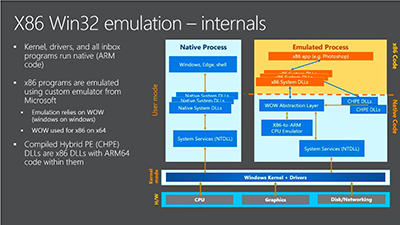News
Intel Raises Patent Infringement Concerns About x86 Emulation Plans
Microsoft and Qualcomm's plans to bring Windows 10 to ARM-based devices could be hitting a snag, namely the intellectual property claims of Intel Corp.
Those plans for Windows 10 on ARM devices were initially unveiled in December at Microsoft's WinHEC event for hardware partners. The WinHEC keynote talk showed Windows 10 running on a device using Qualcomm's four-core Snapdragon 820 ARM-based processor. These ARM-chip devices are capable of running big applications, such as the Microsoft Office suite and Adobe Photoshop on devices of various form factors. They can run not just Microsoft's Universal Windows Platform (UWP) apps, but also the older Win32 applications via x86 emulation technology.
x86 Emulation
The Windows 10 on ARM technology was further explained more recently during Microsoft's May Build event for developers. A Microsoft video produced for Build explained that Windows 10 on ARM machines will run ARM code, but they'll also have an "emulation layer" for x86 code, built by Microsoft, which will run on top of the Windows on Windows (WOW) layer. The WOW layer is assisted by "compiled hybrid portable execution" (CHPE) library files, which help ARM-based devices achieve "near native performance" when running x86 applications, according to the video.
The concept is illustrated in this Microsoft slide from the Build video:
 [Click on image for larger view.]
Diagram showing how x86 emulation works on ARM chips. Source: May Microsoft Build video.
[Click on image for larger view.]
Diagram showing how x86 emulation works on ARM chips. Source: May Microsoft Build video.
Intel, a long-time partner with Microsoft on Windows, also was present during the WinHEC keynote presentation last year. It all seemed like happy talk back then. There was no alarm raised by Intel about the prospect of x86 emulation on ARM.
Intel Speaks Out
This week, Intel showed some possible dissent on the matter. It came in the form of an Intel editorial attributed to Steven Rodgers, Intel's executive vice president and general counsel, and Richard A. Uhlig, an Intel Fellow in Intel Labs and director of Systems and Software Research. The editorial highlighted 40 years of Intel x86 technological improvements.
According to that editorial, Intel launched its first product with x86 technology back in 1978, but the company has been enhancing its x86 instruction set architecture (ISA) ever since. Intel has taken measures to protect its x86 intellectual property over the years, including fending off Transmeta Corp., among others. Overall, it has been a good run for Intel, but the editorial pointed to one recent exception:
There have been reports that some companies may try to emulate Intel's proprietary x86 ISA without Intel's authorization. Emulation is not a new technology, and Transmeta was notably the last company to claim to have produced a compatible x86 processor using emulation ("code morphing") techniques. Intel enforced patents relating to SIMD instruction set enhancements against Transmeta's x86 implementation even though it used emulation. In any event, Transmeta was not commercially successful, and it exited the microprocessor business 10 years ago.
Such blunt talk about x86 emulation seems to imply that possible legal action by Intel might be in the works, given the context of Microsoft and Qualcomm's recent x86 emulation efforts. In response to a question along those lines, Intel didn't deny the possibility.
"Intel respects intellectual property rights and we expect others to do the same," an Intel spokesperson said via e-mail on Thursday. "x86 technology is both proprietary and central to our business, and we're concerned any time it appears that others may be copying it inappropriately. We will thoroughly evaluate any products that claim to emulate x86 technology, and vigorously enforce our intellectual property rights if we believe they are infringed."
Perhaps Microsoft, Qualcomm and ARM Holdings had paid to use licensed x86 Intel technologies? The answer seems to be "No." I asked the spokesperson if Intel had ever licensed its x86 holdings to other companies.
"In addition to Intel, the only other suppliers of x86 compatible microprocessors today are AMD and Via Technologies, and it is public information that both are licensed by Intel," the spokesperson explained.
Microsoft and Qualcomm's haven't exactly said when Windows 10 ARM devices might start to appear in the market. However, if Intel's editorial means what it implies, it's possible that such devices might not see the light of day, barring courtroom action or some sort of patent licensing deal. A licensing deal could increase the price of such devices, perhaps affecting their market viability, given the competitive mobile device market.
About the Author
Kurt Mackie is senior news producer for 1105 Media's Converge360 group.